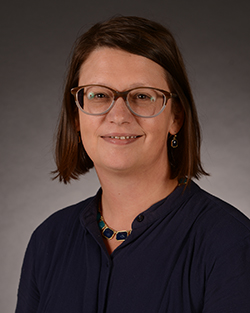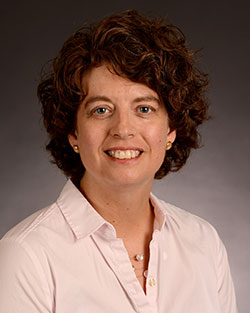Morehead State faculty Hare, Mefford receive NIH grant funding for microbiology research
Morehead State University has a long-standing reputation for academic quality, including the impactful work MSU faculty are doing in the classroom and through their research. This year, two MSU biology professors were awarded substantial grants from the National Institutes of Health (NIH) of more than $400,000 each.
Dr. Melissa Mefford, assistant professor of biology and chemistry, received funding from the NIH for her research titled, "Telomere and telomerase evolution in S. cerevisiae." Dr. Janelle Hare, professor of biology, received NIH funding for her work titled, "Mechanisms of Action of UmuD in Regulating DNA Damage-Induced Genes in a umuC-Deficient Bacterium."
According to Dr. Shannon Harr, director of the Office of Research and University Sponsored Programs, only approximately 20% of NIH grant proposals receive funding.
"NIH is one of the most competitive funding agencies," Harr said. "For us to receive two in the same year is just a testament to the quality research happening at Morehead State University."
 Mefford grew up in Virginia and earned a bachelor's degree in biology from the College of William and Mary in 2003, earned her Ph.D. in Genetics from the University of Chicago in 2009, and completed her post-doctorate at John Hopkins University in 2016. She said one of the things she loves about working for MSU is that it allows her to do fulfilling work in the classroom and the lab.
Mefford grew up in Virginia and earned a bachelor's degree in biology from the College of William and Mary in 2003, earned her Ph.D. in Genetics from the University of Chicago in 2009, and completed her post-doctorate at John Hopkins University in 2016. She said one of the things she loves about working for MSU is that it allows her to do fulfilling work in the classroom and the lab.
"One of the things that was very attractive about Morehead State is that it's primarily an undergraduate institution, but it has a lot of support for research," Mefford said. "I like being able to do both of the things I love...to have a research lab where I can give undergraduates their first taste of research as well."
Mefford's research at MSU is a continuation of research she started in her post-doctorate studying telomeres, the ends of linear chromosomes, and telomerase (the enzyme that helps maintain telomeres). Since the shortening of telomeres during DNA replication is involved in health issues like aging and cancer, Mefford is utilizing the model organism budding yeast (S. cerevisiae) to genetically engineer circularized versions of linear chromosomes lacking telomeres.
"Some organisms have circular chromosomes; others have linear chromosomes with ends on them. The ends cause a lot of problems for a cell," Mefford said. "Essentially, everyone said you will never be able to circularize a linear chromosome. But, we have."
 Hare earned a Bachelor of Science in Microbiology and a Bachelor of Arts in Biology from the University of Iowa in 1992. She earned a Ph.D. in Biomedical Sciences from SUNY (State University of New York) Albany. She also completed two post-doctoral fellowships: One for the National Science Foundation at Grinnell College in Iowa and the other at the Howard Hughes Medical Institute at Washington University in St. Louis.
Hare earned a Bachelor of Science in Microbiology and a Bachelor of Arts in Biology from the University of Iowa in 1992. She earned a Ph.D. in Biomedical Sciences from SUNY (State University of New York) Albany. She also completed two post-doctoral fellowships: One for the National Science Foundation at Grinnell College in Iowa and the other at the Howard Hughes Medical Institute at Washington University in St. Louis.
This grant is the fourth Hare has received from NIH for her research in microbiology.
"To my knowledge, I don't know of any other researcher at any other regional institution in Kentucky that has received as many of these NIH awards as Janelle has," Harr said.
Hare's current research focuses on bacterial processes to control their responses to environmental stimuli that damage their DNA. Once DNA damage occurs, the method that bacteria use to deal with the damage can cause a mutation, rendering them resistant to antibiotics. In studying these specific bacteria, she hopes to find particular proteins that interfere with bacterial growth and replication in the human body.
"We can learn a lot from bacteria that we can apply down the road to mammal and human cells," Hare said. "Bacteria we study cause a lot of infections in people that are in the hospital. That's, of course, worth figuring out."
Hare said in addition to this, grant funding helps aid research at MSU in various ways, whether it is attaining very specialized samples and equipment or allowing researchers to share their knowledge and results with the world through attending conferences. However, one of the main benefits of the grant is its ability to financially support undergraduate students as they conduct ground-breaking research and experience the scientific process firsthand.
"Research is teaching, and these researchers involve students in their research every day, and these students who are fortunate enough to be involved in the research in the Department of Biology at Chemistry at Morehead State University are being well prepared for their chosen career paths," Harr said.
To learn more about research opportunities at MSU, visit www.moreheadstate.edu/undergraduateresearch.
For information MSU's Department of Biology and Chemistry, visit www.moreheadstate.edu/biochem, email bioc@moreheadstate.edu or call 606-783-2945.
